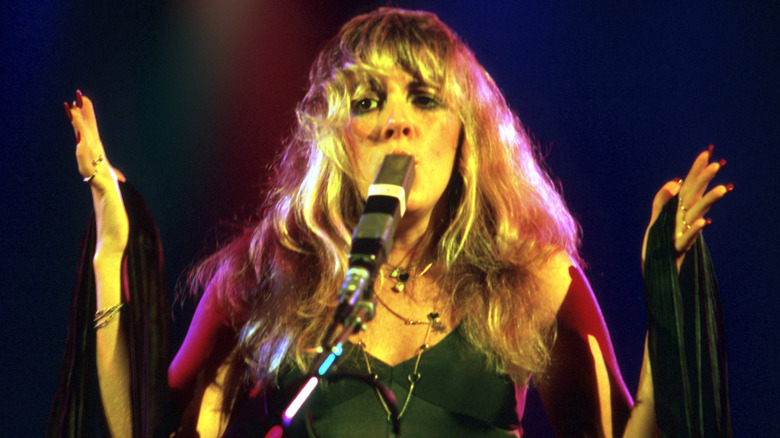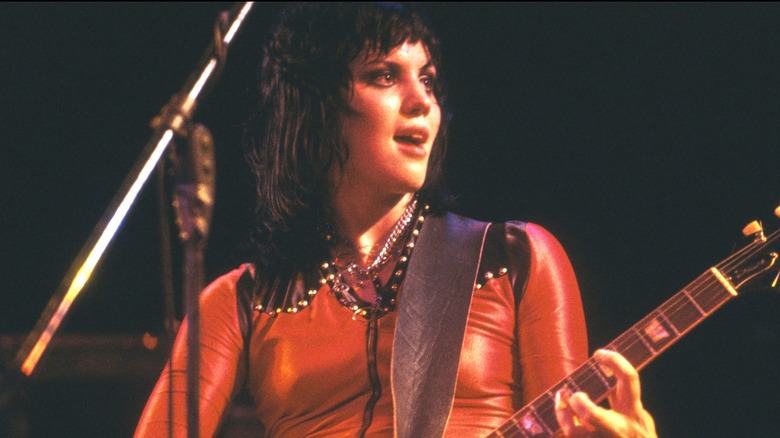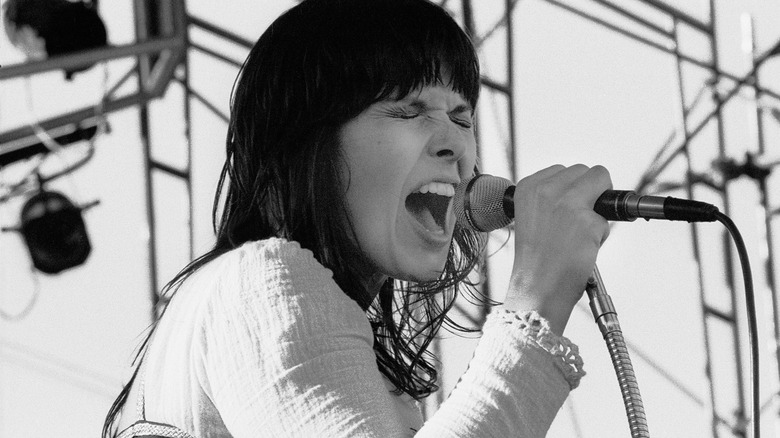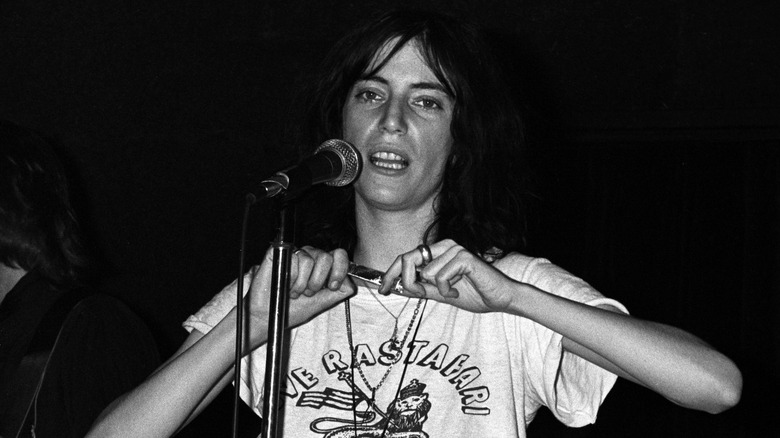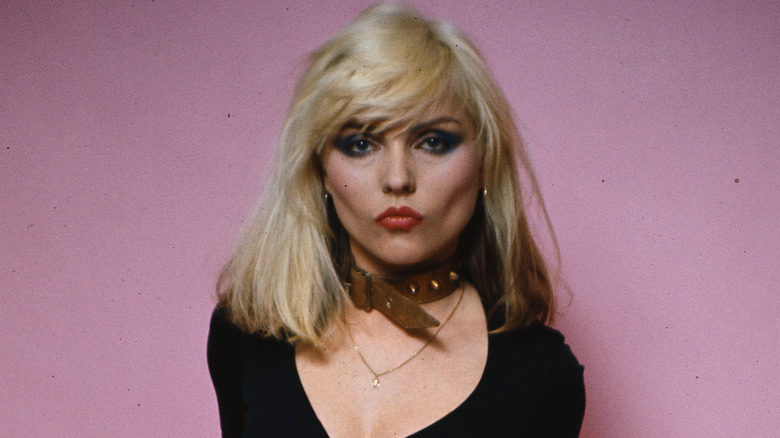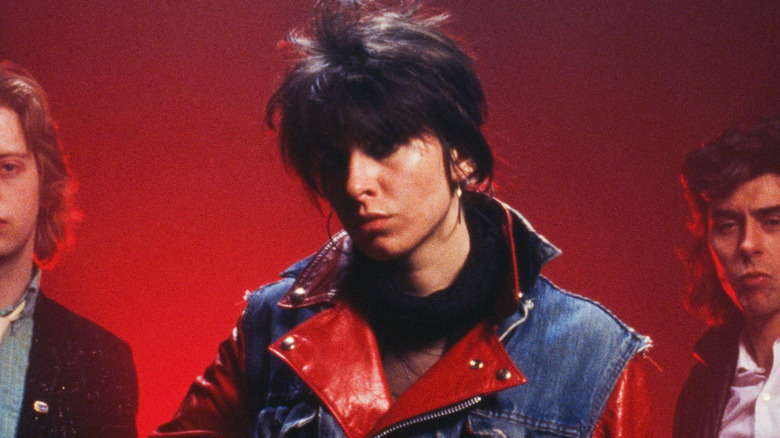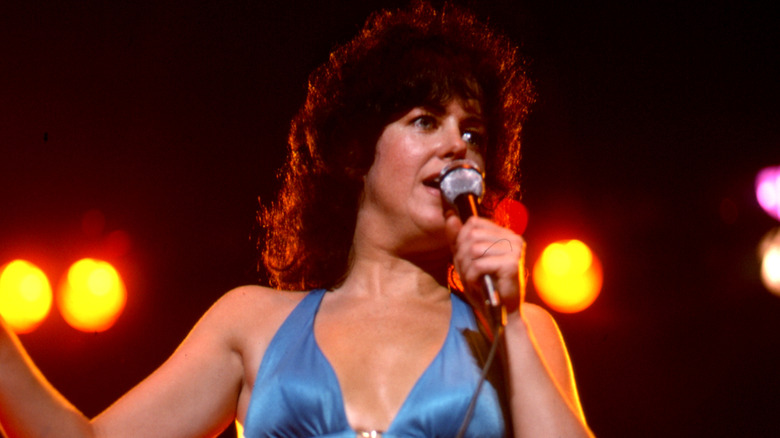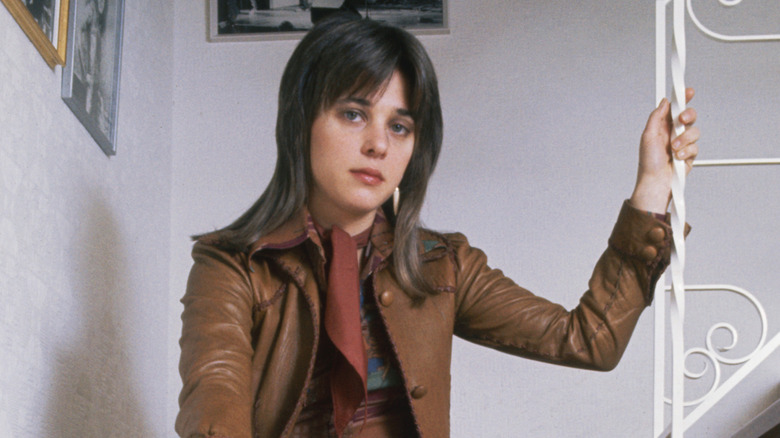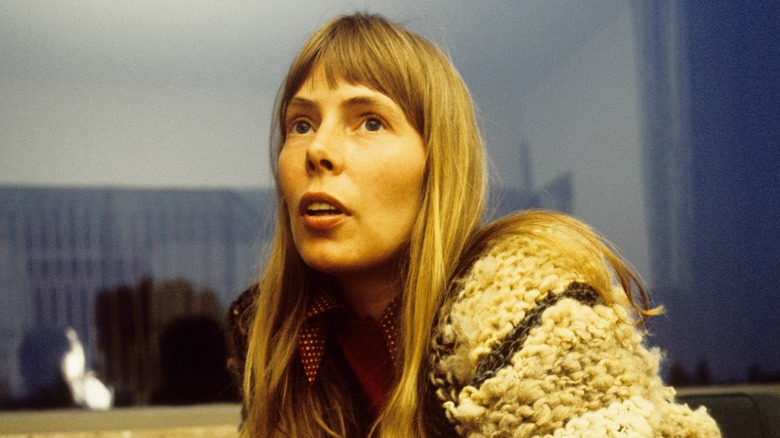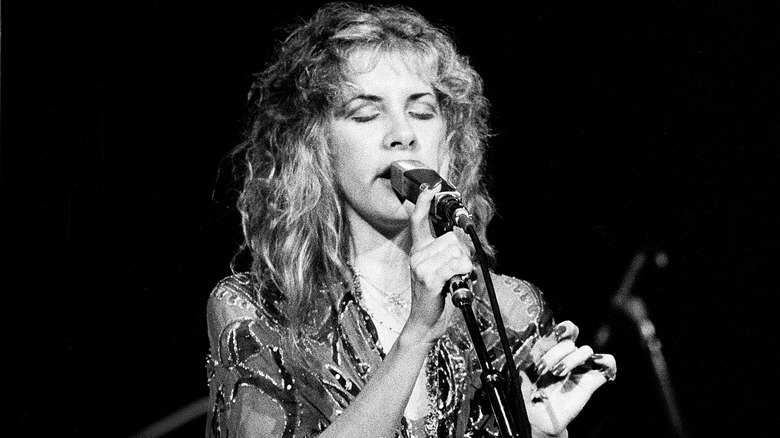Female Rockstars Who Completely Dominated The 1970s
When you think back to the '70s, blue eye shadow, shag carpets, and the best retro hairstyles probably come to mind. What also probably rings a bell is all the iconic music that came out of this era. As popular as bands like Led Zeppelin, Queen, and Pink Floyd were, there were also several female-led groups and solo acts who helped encourage the evolution of rock music as we know it.
During Roe v Wade, the "Battle of the Sexes" tennis match, and Take Back the Night marches, the '70s were a significant era of women proving themselves and fighting for their rights. It should be noted that there were countless female pioneers of music before them that paved the way for the following generations of musicians, from Sister Rosetta Tharpe to Billie Holiday and the iconic Aretha Franklin. Without inspirational trailblazers like these women, female rockstars who completely dominated the 1970s wouldn't have been nearly as successful or held in such high regard as they are today.
From Joan Jett to Stevie Nicks, here are the badass female rockers who made a stand during this significant time period and paved the way forward for modern artists like Phoebe Bridgers, Haim, and Florence Welch.
Joan Jett
Joan Jett was just 14 when she got her first guitar and, almost immediately, formed her first serious band The Runaways. Alongside the singer and guitarist were Sandy West, Cherie Currie, Jackie Fox, and Lita Ford, and despite being ahead of their time with punk rock hits like "Cherry Bomb," the band never really received proper accolades while they were around. After four albums, The Runaways were dropped from their record label and they split up in 1979. Jett pursued her solo career and came out with beloved '80s hits like "Bad Reputation" and "I Love Rock 'n' Roll."
Out of all the actors who look exactly like the real life people they were playing, Kristen Stewart nailed her portrayal of Jett in the film "The Runaways." As it turns out, the movie wasn't all that far off from the rockstar's real-life experience, including a scene in which she's told girls can't play rock music.
"Even as a kid, it was so illogical to me — it's like, what do you mean?" Jett remarked during her conversation with Interview Magazine in February 2010. "That girls can't master the instruments?" The singer had known girls at school to be quite proficient in music, but that sentiment had little to do with the instruments. "What you mean is they're not allowed, socially — it's a societal thing," Jett said. Of course, that never stopped her and, as the lead songwriter for The Runaways, she pushed a lot of boundaries by '70s standards.
Ann Wilson
Whether you're a Heart fanatic or just like their more popular tracks, like "Crazy On You" and "Barracuda," there's no doubt that you've heard Ann Wilson's powerful vocals at least a few times in your life. With so much power and soul in her pipes, it's surprising to know that she was insecure growing up. Having dealt with obesity and a stutter as a child, Wilson turned to singing to boost her confidence and developed a unique sound that often graces the radio today.
In 1970, she responded to a newspaper ad posted by the rock band Heart, then made up of Steve Fossen and Roger Fisher, who were looking for a lead singer. Four years later, Wilson's younger sister Nancy joined the band, and together they served as inspiration for young women everywhere. It doesn't seem like their gender played much of a role in the young musician's minds at the time, though.
"Nancy and I just got together and had a vision of playing music and we didn't really take into account the fact that we were women," Wilson explained during an April 2017 interview with The Aquarian. "At the beginning, we just wanted to do it." Heart's 1976 debut album "Dreamboat Annie" peaked at number 7 on the U.S. albums chart and the band's sophomore effort was also a massive success. For the better part of 50 years, Wilson has demonstrated her incredible talent and still performs with Heart to this day.
Patti Smith
Thinking back to the early days of punk rock, notable figures include Iggy Pop or the Ramones. But ever since Patti Smith came onto the scene with her first album "Horses," which debuted in 1975, she has been solidifying her nickname "the Godmother of Punk."
From an early age, the "Gloria" singer found solace in artistic expression. John Coltrane, Picasso, and school plays helped foster Smith's creativity growing up as she moved between Chicago, Philadelphia, and New Jersey. After high school, the rockstar moved to New York City where she began doing poetry readings, eventually favoring the accompaniment of music. Smith, realizing the compelling nature guitar added to her verses, then formed a band, which was credited for producing one of the first punk songs, "Piss Factory," back in 1974. She has since gone on to publish 10 more records.
In speaking with The Telegraph in November 2020, the singer commented on how far the music world has come in terms of inclusivity. "I think we've made tremendous strides," Smith said. "When I was young, I never saw any girls playing electric guitar, but now girls do whatever they want." Despite paving the way for countless artists and serving as a feminist icon, Smith still takes issue with labels. "One of my goals was to create space for women, but I also was hoping that we didn't have to label ourselves as a 'female artist,'" she explained. "I resented that. ... We don't use the expression 'male artist.'"
Debbie Harry
Often mistakenly referred to as the band name she fronted, Blondie, Debbie Harry was a force to be reckoned with back in the '70s and into the '80s. She was inspirational in more than just the music world — the "Heart of Glass" singer was a fashion icon, too. After coming up in New Jersey, Harry moved to New York and worked a series of odd jobs before forming Blondie with Chris Stein in 1974. Although they were successful, it wasn't until the late '70s the band became mainstream.
It seemed she had it all, but Harry experienced tragedy throughout her life as she grappled with fame while dealing with addiction, an assault, and her abandonment issues. Despite it all, she cemented herself as one of the greats. In her conversation with The Talks back in June 2021, Harry was asked when she knew she had become a full-fledged rockstar.
"You know, the fickle finger of fate, you're only as big as your last hit," she replied. Harry went on to explain that it wasn't until after Blondie broke up and then reunited in the '90s that someone asked her about being an icon. "I had never really thought of using that particular word. It was kind of shocking, and I wasn't so sure about it," Harry remarked. "But I guess with the passage of time and looking back at some of the things I did and some of the things we did musically, it really was iconic."
Chrissie Hynde
Although Chrissie Hynde formed The Pretenders in the late '70s, and their hit "Brass in Pocket" came in 1979, she's still considered a rockstar who dominated the decade. As many musicians do, the singer dropped out of college and worked as a waitress before venturing to the big city to pursue her passion. As a longtime lover of British Invasion bands, Hynde found herself in London where she found the right bandmates to accompany her distinctive and punky vocals.
At the time, women-led bands were definitely the minority. However, Hynde served The Pretenders as the lead singer, rhythm guitarist, and main songwriter, and inspired countless young women. She might not see it that way, though, as she clarified in speaking with NPR in October 2015 she didn't think "Brass in Pocket" was an empowering anthem for women. "It's just a three-minute rock song. I don't think it's as loaded as that," Hynde explained. "I'm not here to embolden anyone."
Still, her impressive come-up from Akron, Ohio to present-day songstress with 12 studio albums under her belt can't be ignored. Growing up, Hynde said, she never thought about becoming rich and famous. "I just liked music, and I really liked rock guitar," the "Stop Your Sobbing" singer remarked. "I didn't think I was going to be a rock guitar player, because I was a girl. I would've been too shy to play with guys."
Grace Slick
When it comes to some of music's most iconic voices of all time, Grace Slick of Jefferson Airplane always comes to mind. As a kid, she and her family moved all over the United States, during which time her education was far less important to the singer than having fun. By the late '50s, she had left college in New York and made her way to San Francisco to bask in the hippie scene that began to take root there.
The sensibilities placed upon young ladies in the '50s was stuffy, and simply didn't appeal to Slick, which she acknowledged during her conversation with The Guardian in February 2025. "Don't offend anybody, dress a certain way, get married, have children, stay at home and cook pies," she quipped. "A whole bunch of women I knew at that time thought: 'Don't think so!'"
After learning of the band Jefferson Airplane and taking inspiration from their unique sound, Slick formed her own band, calling it the Great Society. She and her bandmates booked gigs alongside the group and, when Jefferson Airplane's lead singer left, Slick was asked to replace her. In the late '60s, they put out memorable tracks like "Somebody to Love" and "White Rabbit," and by the time the '70s rolled around, the band evolved. Slick ventured into some solo efforts and Jefferson Airplane became Jefferson Starship, which found some success with albums like "Dragon Fly" and "Red Octopus."
Suzi Quatro
There's dozens of vintage celebrity styles from the '70s that would look strange today, and Suzi Quatro has probably rocked most of them. It seems like the rockstar was destined for stardom from a young age, as she came from a large musically-inclined family based out of Detroit, Michigan. "As the fourth child of five, I needed to find a way to make myself me and not one of five," Quatro told The Guardian in July 2015. "It spurred me to find my own path."
When she was just 14 years old, the "Daytona Demon" singer and her older sister formed the band The Pleasure Seekers. "I was 21 when record producer Mickie Most saw the band," Quatro explained. "He just wanted me. I didn't plan it that way, it's just how it happened." She moved to England where Most made her a star in her own right, but this of course caused some tension between herself and her siblings. As a solo artist Quatro explored sub-genres of rock, including glam and bubblegum, throughout the '70s while also putting out hit after hit, like "Devil Gate Drive" and "Can the Can."
Quatro was such a staple of the era that she even landed a recurring role on "Happy Days" as Leather Tuscadero. During this time, the "Stumblin' In" singer redefined what it meant to be a female rockstar and blazed her own trail. "You make your life what it's supposed to be," Quatro noted.
Joni Mitchell
Many musicians find solace from the misfortunes in their lives by playing instruments, and Joni Mitchell's tragedy was no different. When she was just 9 years old, the Canadian-born performer contracted polio and began singing to entertain the other patients at the hospital. Mitchell taught herself to play guitar, went to college, and emerged on the music scene as a compelling lyricist and folk singer. Though she became recognized in the late '60s, with her second album earning her a Grammy award, 1971's "Blue" was an even more popular record that went platinum.
When asked during a July 1979 interview with Rolling Stone whether she believed she'd achieved greatness, Mitchell remarked, "Greatness is a point of view." The "Big Yellow Taxi" singer pointed out how the term is difficult to define: "Honesty? Genius?" Instead, Mitchell explained that she was evolving in her own way. "I am growing as a painter. I'm growing as a musician. I'm growing as a communicator, a poet, all the time," she said.
To this day, Mitchell is revered as a trailblazer in rock and folk music, with 19 studio albums and 10 Grammys to her name. Sadly, the singer suffered a brain aneurysm in 2015 that forced her to relearn everything from walking to singing and playing the guitar. Despite her hardships, Mitchell still has graced the stage and delivered remarkable performances to both old fans who have stuck with her since her early success, as well as newer devotees.
Stevie Nicks
Not mentioning Stevie Nicks in this lineup of female rockstars who dominated the 1970s would be like omitting Michael Jackson's name from top pop icons of all time. Her incredible vocals and heart wrenching lyrics made Fleetwood Mac the sensation it was and remains to be today. In February 2022, Nicks sat down with the New York Times to discuss her career, and she made it clear that she was also going to be great at whatever it was she wanted to do because of her mother's encouragement.
"She said, 'You are going to be an independent woman if it kills me,'" Nicks said, quoting her mom. "'Wherever you go, whatever you do ... you are going to stand in the middle of a room full of men and you are going to be way ahead of them. They are never going to look down on you as a woman.'"
After moving around throughout her childhood due to her father's job, the "Landslide" singer finally found her calling in California and began producing music while in high school. Nicks enrolled in college but dropped out after a short period and pursued singing instead. After struggling to gain much notoriety as a musical duo, she and her then-boyfriend Lindsey Buckingham were discovered by the band Fleetwood Mac in 1975 and they signed to join them — and the rest is history. Since then, Nicks has had a stunning transformation and became a legendary icon of the '70s and '80s.
